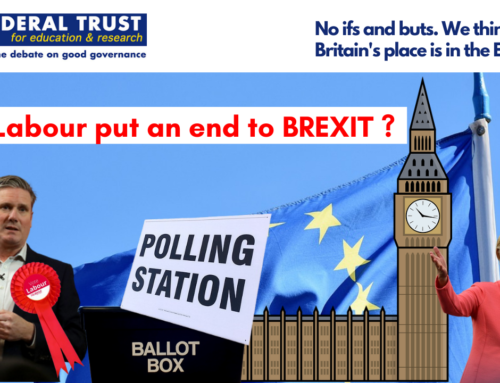
by Denis MacShane
Former Minister for Europe. His latest book Brexiternity. The Uncertain Fate of Britain is published by IB Tauris-Bloomsbury.
Recent elections in Europe raise the question: Is the decade of populism over? For ten years the heralds of populism from the Dutch-American Professor, Cas Mudde, a favourite of the Guardian on the left to Professor Matthew Goodwin, a favourite of the Murdoch press on the right, have been promising us, or perhaps threatening us with a populist take-over. Professor Goodwin announced 5 UKIP MPs would win seats in the 2015 General Election. None did.
In 2018, Professor Matthew Goodwin, proclaimed that “National populism is unstoppable”. His influential book “National Populism. The Revolt Against Liberal Democracy” was picked up by comment page editors who know little of European politics.
The view remains fashionable. “The specter of populism is haunting the West “ write two professors, Sergei Guriev of Sciences-Po in Paris and Elias Papaiounnou at the London Business School, in a major new academic study of populism.
Their steal of the opening line of the Communist Manifesto isn’t quite backed up by 170 pages of detailed examination on the large number of books and academic studies with references back to 1900.
Populism lies in the eyes of the beholder so academics can define their own version of populism to prove their theses. Arguably the most successful post 1945 populist parties in West Europe have not been on the right but the giant mass membership communist parties in France and Italy which up to the late 1970s commanded 25-30 per cent of votes, far more than rightist populist parties this decade. The populist communists controlled regions and cities in Italy, and were in the French government in the 1980s.
In Latin America Peron and Peron-style populist dominated politics in several nations much as India’s Prime Minister Modi and his Hindu nationalist BJP party does today.
But in our corner of the world, Europe is, if anything. turning its back on anti-European, nationalist, and racist populism.
In two recent major German regional parliament elections, the anti-EU and racist AfD party failed to score over 10 per cent. Instead the pro-EU Greens and pro-EU Social Democrats emerged as winners. In the Dutch general election, the Islamaphobe PVV party of Geert Wilders lost seats while the big winner was the liberal-left and strongly Europeanist D66 party. Its leader, Sigrid Kaag, precisely fits the bill of a “Citizen of Nowhere” as Theresa May famously sneered at British pro-Europeans in her first speech to the Tory Party conference after Brexit in 2016.
Ms Kaag speaks 6 languages, did university studies in England, worked for different UN agencies, married the Foreign Minister of Arafat’s PLO with whom she has 4 Dutch-Palestinian children, and is loathed by the anti-EU and anti-Muslim Dutch right.
Nonetheless she led the D66 to a stunning win and with the equally pro-EU liberal rightist, Mark Rutte, who topped the poll, there is no Brexit cross infection from England to the Netherlands.
All populist politics is based on whipping up hate of an enemy on behalf of an the “people” and the “nation” who are being denied core existential rights by outside forces.
These outside forces may be immigrants, the EU, the facts and truth based media in Donald Trump’s populism or London in the case of Scottish nationalist populism, or Madrid for Catalan populists.
Populism is usually seen as a right-wing phenomenon. However there is green populism which seeks to generate emotion against the science of fission energy, most manufacturing, or industry or left populism in the manner of Jeremy Corbyn which singles out market economics or the existence of Israel or the left anti-EU populism of Jean-Luc Mélenchon in France or Yanis Varoufakis in Greece.
But this decade academics and many media pundits have enjoyed a wallow in the idea that new national identity politics would weaken and even speed up the disintegration of the EU. The combination of the Brexit vote and election of President Trump in 2016 seemed to prove the point.
There was endless talk about Marine Le Pen in France, Matteo Salvini in Italy, Geert Wilders in the Netherland, the Alternative für Deutschland (AfD) in Germany, Golden Dawn in Greece, the Austrian Freedom Party which was founded by two ex-Nazis in Austria winning enough seats to tip the balance of power.
But it didn’t quite happen. Angela Merkel and her social democratic coalition partners beat off the AfD Germany in 2017 and the same year the liberal technocrat Emmanuel Macron easily saw off a challenge from Marine Le Pen.
The Austrian nationalist populists in the Freedom Party disintegrated after a secretly videoed meeting discussing finance from a Russian woman in exchange for government contracts. Matteo Salvini hoped to make a breakthrough in Italy’s regional elections but lost out badly to moderate left and centrist parties.
The Italian prime minister is the nation’s leading pro-European, Mario Draghi. His predecessor as prime minister, Giuseppe Conte, has taken over the leadership of the 5 Star Movement (M5S) once vocal in blaming all of Italy’s problem on Brussels. Conte has made clear he will seek a constructive relationship with the EU. The new leader of the main social democratic left Partido Democatica, Enrico Letta, is a former prime minister, who went to run the international work pf Sciences Po, the elite Paris university, as well being president of the Jacques Delors Institute . There is a new rightist anti-EU and racist party, the Fratelli, but Matteo Salvini has toned down his anti-EU demagogy as his business paymasters in Northern Italy have made clear Euroscepticism is dead end politics for Italy.
The prime ministers of the EU’s three Nordic member states, Sweden, Denmark and Finland are all pro-EU social democrats as are the prime ministers of Spain and Portugal. They like Mark Rutte in the Netherlands all have differences with Brussels but not to the point of challenging EU membership.
In the European Parliament elections of 2019, the claims, especially in the London media, that continental clones of the Brexit-UKIP party in Britain would do well failed to materialise. If anything the new rising parties in Europe are green and believe that more power and authority needs to be shared in Europe on climate change and Europe should speak with a single voice and show leadership in the global struggle to save the planet.
Outside the EU, the Swiss People’s Party which for 30 years has marketed itself as the voice of the Swiss people against Brussels lost votes in the most recent federal parliament election. A year later, 2020, the Swiss people in a referendum voted to embrace freedom of movement in order to have a positive relationship with the EU.
President Trump has been defeated by Joe Biden, a pro-EU American politician over many decades. In his first appearance in Europe at the Munich Security Conference, President Biden, said: “The United States will work closely with our European Union partners and the capitals across the continent — from Rome to Riga”. He added, “It’s great to be with Emmanuel and Angela” – no mention of “Boris.”. The words “United Kingdom”, “Britain”, or “Prime Minister Boris Johnson” appear nowhere in the American president’s speech. In a dig at the UK prime minister President Biden pointed out that “Putin seeks to weaken the European project and our NATO Alliance.” Weakening the European project, of course, has been the life’s work of the British Prime Minister Boris Johnson.
The Covid crisis has exposed the hollowness of the populist line that nations were submerged by immigrants or that by adopting 1930s style orthodox fiscal economics and deregulation all markets would do much better.
The world has seen foreign immigrant doctors and nurses putting their lives on the line to look after patients in hospitals, including Britain’s prime minister with care homes in nearly every country completely dependent on immigrant workers.
The EU has stepped up to the plate with a massive Keynesian spend-what-it-takes package based on borrowing and government deficits – the opposite of the austerity ideology promoted by George Osborne, Nick Clegg and EU technocrats after 2010.
The line from Marine Le Pen and Matteo Salvini that all would be well in France or Italy if only the EU did not exist has fewer and fewer adherents. Even in Brexit Britain only 39 per cent of those polled any longer think cutting links with Europe is a good idea.
This is not a return to 20th century politics dominated by two giant political formation of the centre-right and centre-left. There are now players who win serious votes – the Greens in many countries, nationalist or regional identity politicians in Scotland, Bavaria or Catalonia.
It is almost impossible to form a government without forming a coalition which is likely also to be the case in Britain as Brexit flounders and Scottish separatism takes off.
We will see if Trump’s defeat buries the spirit of 2016. The recent outburst of Francophobe hate in the press over the Astra-Zeneca vaccine with descriptions on Twitter of the European Commission president as Ursula von der Mengele show how virulent the hard Brexit ideological variant is.
There are nations in Europe still in the grip of nationalist populists including Poland, Hungary and Turkey. In the case of the former, their sniping at Brussels never goes so far as to risk the mammoth transfers of money from the EU as well as access to the EU Single Market and the 4 Freedoms. EU membership has allowed Hungary and Poland to make more advances in terms of national wealth, a restoration of national pride, and a modernisation of their economies, health care, and social welfare provisions in the two decades since joining the EU than in the previous two centuries.
Boris Johnson proclaimed on the eve of the 2016 referendum that hundreds of millions of European would be inspired by a Brexit vote and seek to leave the EU. The opposite has happened. The EU has got stronger, with more shared power and resources notably in the different trillion Euro plans to relaunch the post-Pandemic economic recovery.
There are problems with the vaccination roll-out and some governments refusing or reluctant to embrace green transitions programmes and the new AI or gig economy. But five years after Brexit Europe is more united than at any time since Maastricht Treaty launched the European Union in 1992. Marine le Pen and Matteo Salvini, for example, have dropped all demands to quit the Euro and renationalise their currencies.
To be sure the question of populism and nationalism will never go away. After a decade of writing on populism there is new trend to discuss the nation. Pascal Ory, a leading French cultural historian, has a new book Qu’est ce qu’une nation? Une histoire mondiale ( What is a nation? A world history. Paris Gallimard) Does a British nation exist? In the British corner of Ireland as well as in Scotland, voters asserted their national identity by voting to stay linked to Europe. They rejected English nationalism which nonetheless had the votes of the forgotten left-behind corners of England. Professor Ory distinguishes between nationalisms – the first integrates, the second excludes. Brexit English nationalism is firmly in the second camp with Northern Ireland and Scotland feeling excluded from the UK and endless exclusionary barriers to British and European citizens, firms, universities, creative artists working together.
The Prime Minister and his intellectual fellow travellers like the historians Robert Tombs and Andrew Roberts and the pundits of the off-shore owned press will try and persuade us that anti-European nationalism is the future for the four nations in the United Kingdom.
Perhaps they will win but a poorer, meaner, isolated Britain is already emerging from the process. There is a vaccum where a post-Brexit European policy should be. But politics like nature abhors a vacuum and at some stage the politics of Brexit nationalism will be challenged.
In the meantime the exit of the UK from EU membership paradoxically opens the way to the discussion of a more federal future for all European nations. There will not be a Federal big bang moment but the imperative to share power, ownership, banking regulation, defence, or to find a common foreign policy vis-à-vis the US or emerging powers like China and India can only grow.
Some have seen a Hamilton moment in the EU Council agreeing to the Pandemic Recovery Package based as it is on a first modest transfer union between rich and less rich regions (nations) of Europe. Such comparisons are always tricky. There are two centuries of stop-start progress in America, including a civil war and other major conflicts between Alexander Hamilton’s federalising of US national debt and today’s federal United States.
But the decision to issue what in effect are Eurobonds, a long-standing policy object of Jacques Delors since 1990, is an important step in the next generation of policies and partnership in the nations of Europe but not England.
Europe is on the move. Britain is getting smaller.






The basic trade and cooperation agreement with the EU-27 has proved woefully insufficient
for Britain’s needs. It has reduced the supply
of doctors, nurses, lorry drivers, agricultural and hospitality workers,
bringing pressure and chaos to everyday life. It has hit or
will damage exports and employment in fishing, food, artistic and other services and it threatens the peace in Ireland.
Leaving the EU internal energy market has doubled
gas prices relative to the rest of Europe. Promised genuinely new trade opportunities have vanished.
Understanding Brexit Options – http://www.sparklingbooks.com/gb.html –
explains alternative relationships with Europe. The detrimental
effect on trade in both goods and services that has been caused
by leaving the single market was entirely foreseeable. As the United Kingdom’s relationship
with Europe changes and evolves, the book documents better options that Britain needs
but are rejected by its politicians. Read the e-book now.
I think to call the European President Ursula von der Leyen “Mengele” is first of all wrong and extremely offensive. Any German hater who wrote this??
Very good article. However, even if populism is weaker in the polls, it is unfortunately not because the EU idea ha been winning the argument. The vaccination saga illustrates the point where despite the indisputable advantage of centralizing the procurement of vaccines, Member States ffind it convenient to blame the EU for their own failings in logistics and management of the pandemic. The Member States refuse to accept that the delays in negotiating by the EU is largely a result of the inadequate institutional framework that reuired the Commision to consider the wishes of 27 Members and wait for unanimous agreement in an aera that is not a competence of the EU. These delays are clearly the responsibility of the European Council and not the Commission. Covid and the many restrictions to liberties imposed is a great opportunity for promoting to the younger generation the added value of the Union, of its four freedoms, etc; This opportunity is largely beeing waisted!
Since we are all allowed “My Truth” here is my concept of populism. For me, populism is what happens when the members of a political party lose their contact with the voters. In 2020-21, the significant loss of contact has occurred on the left, with a political elite espousing the Baizou/woke: No Borders, no States, censorship by Government or Silicon Valley, Universal Basic Income and identity politics. Many voters who used to support left-leaning politics, including me in many ways, do not support these things. But we favour democracy. So we are forced to look hard at what else is on offer. Trump had a good offer on policy which appealed and still appeals to many many Americans. I don’t see any European politician with a successful program comparable with Trump’s platform of sort the Border, Energy Independence, end foreign wars, stand up to China and Silicon Valley. All of which had a direct practical appeal in the US, and to a lot of people in the UK for surely obvious reasons. Populism in this form is valid surely? Perhaps some things fall outside this simple paradigm eg: Rejoin the EU (Yes please), climate change and a more Sumptional response to ‘Flu.